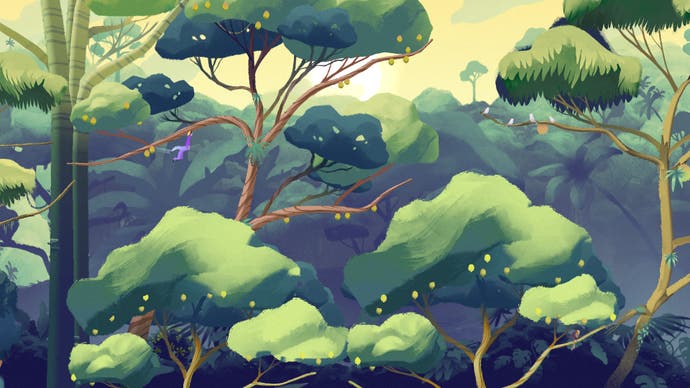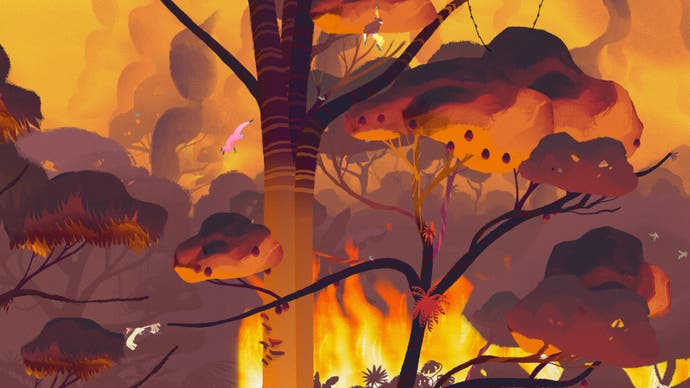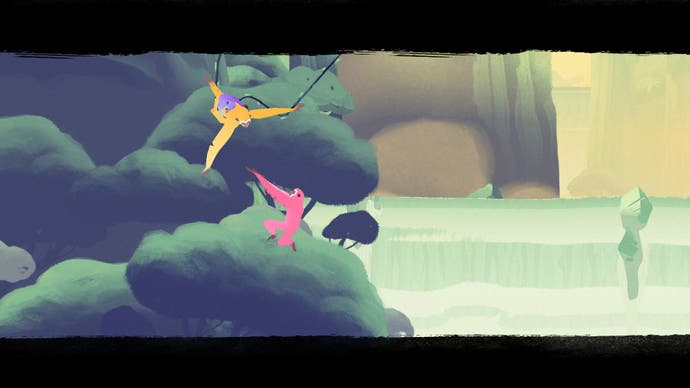Gibbon: Beyond the Trees tells a story about deforestation in a really clever way
It canopy true.
Gibbon: Beyond the Trees isn't a long game - it's about an hour long with the option of playing on after - and it isn't a complicated game either. I like to think of it as an endless swinger, in 2D. In the game, you are a gibbon and you hold down a button to swing and then release it to move through the air and keep your flow of momentum going. That's it, really. There aren't any objectives beyond travelling to the end of a level, nor is there any reading to do, so everything the game says, it says within those modest confines.
And say something it does: Gibbon: Beyond the Trees tells a story of deforestation in the name of palm oil, and the horrid mega-fields of mono-crops grown to produce it. But though it has a clear angle, it doesn't preach, and that's what I find remarkable about it.
The game's main draw is that flow of momentum I mentioned above, and it's amazing how instinctive this is. It's a video game thing to want to move quickly and not be held up by obstacles, I think - something I can remember as far back as games have been in my life - and it's exactly what Gibbon: Beyond the Trees trades on here.
To expand a little on movement. You can swing, which is quite fast, or you can run or slide, depending on the slope. Sliding is fastest, swinging second, running slowest, so you're always looking for dips to slide in but hesitating because of the risk-reward factor involved in pulling them off, which, if you don't, can put the stoppers on you. You can also hold the swing button for too long and over-rotate at the end of a branch, holding you up again.
Slowing down may not be the end of the world - it's pretty quick to get going again - but it can prevent you from missing a jump and ending up on the floor. And again, while that's not a deal-breaker - you don't die if you land on the floor - you're not at your most effective when you're down there, and you can really feel it.
The game teaches this gently before mixing in a couple of more advanced moves, like an assist - where you're flung like a trapeze artist by your mother (I think she's your mother) - and a somersault, which, if you can fully rotate, gives you a speed bonus the next time you swing or slide. But it's tricky to keep alongside your mother for the assist, and the somersault is slow to perform, so there's a bit of a challenge involved.
What I find clever is how the game spoils you at the beginning with all of this, with the huge, abundant forest and it's myriad branches to swing around on - with the forest in full chorus around you, and your family swinging alongside you, knocking juicy fruit off branches as you go - and your carefree, joyous movement through it, and then how it begins to systematically take it away.

Soon you're swinging above humans with machines to cut that forest down, and where there was once towering life and colour, there's now fire and ash and death, and you're not swinging among that myriad of branches any more, but hopping from lone, charred trees onto metal diggers. And you don't move as freely, the game interrupts your flow. Then: palms - endless rows of stubby, uniform palms. And while they might be green, they're not what you had - they're not tall enough to be the playground you once swung in, and they're deathly quiet, like nothing lives there. And again: you don't move as well in them.
So the story progresses, through palm oil and onto other dangers the gibbons face - I don't want to spoil them all - all the time taking away or modifying the environment around you. And while some of the modifications can be fun, they're never as fun, or as natural and free, as the jungle once was. This, I think, is how Gibbon: Beyond the Trees makes its point.
I like it. I like that the thrill of movement is inherent so it never needs to explain itself or have explanatory clutter. I like how it feels to play, and I like the sense of meditative calm when you slip into its lolloping rhythm. And I like how it gets the point across: we can't ignore a mechanic like we can a story.



